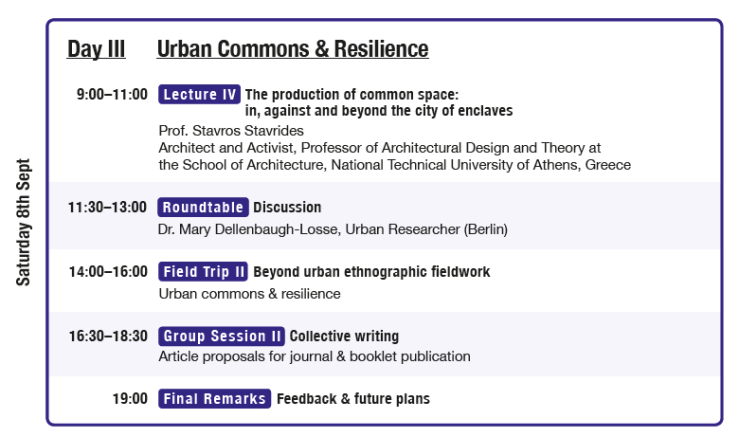DAY III | KOSMOS Workshop “Beyond Urban Transformation”
Urban transformation focuses primarily on the process of gentrification, urban renewal, neo-liberalization of the city, and housing (Smith 1996, Brenner 2002, Larsen 2016). Understanding these processes requires on-the-ground research on the everyday struggles and resilience of urban actors who are constantly adapting to emergent twenty-first century challenges, such as the negotiation of rights to the city, the role and changing patterns of public space, and new spatial practices in the rise of digitalization (Lefebvre 1968, Harvey 2012, Habermas 1989, Miller et al. 2016, and Lim 2002).
Urban societies are ordered hierarchically through a set of implicit rules and conventions, which determine the distribution of roles in a community and the forms of exclusion that operate within it. As ethnographers, geographers, artists and urban planners, our research models must navigate multiple scales of analysis in cities while committing to the fine-grained analysis of everyday life experiences of urban transformations, which reflect the larger scale processes of urban change. Under the broad theme of urban transformation, our workshop will focus on the two sub-themes of urban resilience and urban commons.
Urban commons as a term typically denotes resources used, shared and managed by communities. The concept emphasizes self-determination, self-organization of the social and physical environment. Both the rise in commonly owned spaces and services in democratically governed areas, as well as the notion of urban commons as a product of resilience, raise hopes for the reclamation of cities for the larger public. The urban commons need to be an inclusive arena for a productive contest between various actors and their practices (Mouffe 2013). It is therefore that disciplines like anthropology should obtain the “militant middle ground” and concern themselves with “practice rather than with grand theory” (Herzfeld 2001).
With a focus on urban commons and commoning we focused on three guiding questions for the last day of our workshop:
- What do we understand as the commons, who governs them, what are long-term strategies and short-term tactics as part of the struggle over common space?
- How can we study spatial practices of the contest in physical space, but also through digital means?
- How can a productive contest over the commons benefit inclusive transformation processes and empower communities?
The day started with a keynote from Stavros Stavrides on the production of common places and the potentiality of commoning. Afterwards, Mary Dellenbaugh-Loose and Stavros Stavrides discussed in the “Roundtable Discussion” a variety of issues around urban commons and commoning as process and practice. Around the question of power relations that define, sustain or disable urban commoning, Stavros clarified that the sharing of power is both a precondition and result of commoning, power thereby to be understood as something done by different actors involved. Mary added to this that we need to attend to the complexity of the commons as a concept; one end of the spectrum, they can be understood as tied to emancipatory practice (in reference to Lefebvre). On the other end, they are understood in context with practices on the ground, which show that commons can have very strict rules about participation, decision-making and boundaries. The workshop participants were specifically interested in the question of porosity of such boundaries and the issue of in- and exclusionary practices of commoning, that is, we grappled with the notion of different publics.

Moderation Roundtable Discussion: Aylin Yildirim Tschoepe
